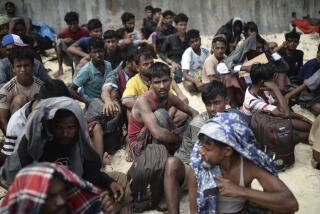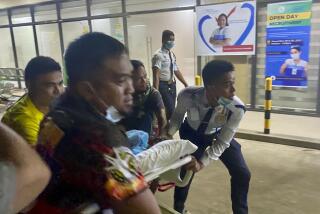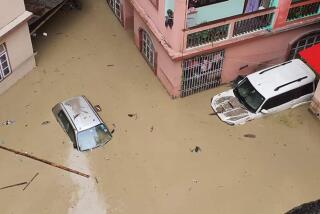Regime unswayed by cyclone
The government of Myanmar said today that the death toll from a weekend cyclone would surpass 10,000, with potentially hundreds of thousands of people left homeless.
The new toll marked a sharp escalation from the previous official tally of 351.
In a broadcast monitored by news agencies, Foreign Minister Nyan Win said about 10,000 people died in Bogalay township, but gave no specific number. He said more than 4,000 died in other areas. Those numbers were not immediately confirmed by international agencies.
Myanmar’s government briefed United Nations agencies on the scale of the disaster Monday, said Stephanie Bunker, the spokeswoman for the U.N.’s Office for the Coordination of Humanitarian Affairs.
The cyclone’s destruction has caused the isolated Southeast Asian nation to reluctantly accept international aid and foreign humanitarian workers to help provide food, water and shelter across the countryside, despite its military government’s deep suspicion of outsiders.
But the regime that has long ruled Myanmar insisted that a controversial referendum on a draft constitution will be held Saturday, as scheduled, despite the disaster.
First Lady Laura Bush, in a rare White House question-and-answer session, chastised Myanmar’s leaders for plans to proceed, saying the vote would give “false legitimacy to their continued rule.” Myanmar’s leaders are deeply superstitious and had determined that, astrologically speaking, May 10 is the most favorable date.
The White House announced that the U.S. Embassy in Myanmar had made $250,000 in emergency funds available immediately for relief efforts, but officials weren’t certain that the government would accept the offer. The aid probably would be channeled through U.N. agencies, and not delivered directly to the Myanmar government, because of U.S. sanctions on the regime.
The updated death toll would make Tropical Cyclone Nargis the worst natural disaster in Southeast Asia since the 2004 tsunami, which claimed more than 220,000 lives. Hurricane Katrina, in comparison, resulted in 1,836 deaths.
The storm struck Myanmar, also known as Burma, on Saturday with winds of up to 120 mph. Particularly hard hit was the fertile, low-lying Irrawaddy River delta, which empties into the Andaman Sea. Images on Myanmar TV showed entire villages underwater or swept away. Fallen trees blocked roads, preventing relief from getting through.
Telephone lines and Internet connections were down, making communication even more difficult in a country whose autocratic rulers keep a tight rein on contact with the outside world. Aid officials said it could be several days or even weeks before a final assessment of death and damage could be made.
Many of the displaced residents in the mostly Buddhist nation were taking shelter in temple pagodas, said Christine South, Asia-Pacific operations coordinator for the International Federation of Red Cross and Red Crescent Societies.
South said by telephone from Geneva that her organization had sent five teams to survey the damage -- two in the capital, Yangon (also known as Rangoon), and three in the Irrawaddy delta area.
The aid workers were distributing about 4,200 emergency kits containing clothing, water purification tablets, tarpaulins and other necessities. The federation also had more relief teams standing by in the region, waiting for a go-ahead from the Myanmar government, South said.
The cyclone may have wider implications for rice production in the region, which is already beset by a food crisis.
“This is the rice bowl of Myanmar, so we have to assess the impact on food production in the longer term,” South said. Myanmar had agreed to supply tens of thousands of tons of rice to Bangladesh and Sri Lanka, according to the World Food Program (WFP), but now those prospects are uncertain.
The WFP is already struggling to provide emergency food aid as fuel and food costs spiral, and the cyclone aftermath will further strain its resources.
In Yangon, there were reports of homes with their roofs blown off and windows shattered, and of roads blocked by fallen trees and other debris. Some power lines were down.
“People are having problems with drinking water,” said Soe Myint, a Burmese political dissident based in New Delhi, the Indian capital, citing information from contacts in Yangon. “Prices of basic commodities have increased.”
The WFP said that it had 3,800 tons of food in Myanmar when the cyclone hit, including rice, beans, and other staples. About a quarter of that has been distributed in Yangon.
“There is a lot of damage, and that’s making it difficult for the teams to get out,” spokeswoman Brenda Barton said in Rome, where the agency is based.
First Lady Bush, who has taken a special interest in Myanmar, told reporters that the administration would work with the U.N. and international nongovernmental agencies to provide water, sanitation, food and shelter and was ready to send an assistance team.
“The government of Burma should accept this team quickly, as well as other offers of international assistance,” she said.
The disaster took on a political dimension when the first lady also said that President Bush would sign legislation today authorizing the presentation of the Congressional Gold Medal to Myanmar dissident leader Aung San Suu Kyi.
The first lady also criticized Myanmar’s government for not adequately warning citizens about the approaching storm.
“It’s troubling that many of the Burmese people learned of this impending disaster only when foreign outlets, such as Radio Free Asia and Voice of America, sounded the alarm,” she said.
Mike Green, a former National Security Council expert on Asia, said in an interview that it was unclear whether the cyclone would provide an opportunity for the United States to engage Myanmar, because “the government has been hermit-like.”
“This will be a real test case,” said Green, who is a senior advisor at the Center for Strategic and International Studies, a Washington think tank, adding that any acceptance of U.S. assistance “would be significant.”
Myint said there was some criticism by residents that Myanmar’s military was slow to mobilize to help citizens deal with the crisis -- for example, by clearing roads in residential areas.
Last fall, the regime was quick to send troops to quell democracy protests. Dozens of people are believed to have been killed in the bloody confrontations that ensued.
Despite the cyclone’s catastrophic effect, it appeared that the military regime remained intent on proceeding with the constitutional referendum on Saturday. But a government minister told foreign diplomats that balloting might be delayed by “a few days” in the hardest-hit areas, the Associated Press reported.
The referendum is on a draft constitution that is supposed to the pave the way for democratic elections in 2010. The draft also reinforces the power of the military regime, giving generals the right to intervene in politics and reserving 25% of parliamentary seats for army officers, which gives them a veto over constitutional change. Exile groups have charged that the voting is rigged and that citizens have been compelled to vote in favor of the measure.
“It is certainly a predetermined result,” said Tion Kwa, an Asia Society fellow who follows Myanmar closely. “ We can be pretty sure that it will pass and with a sizable majority.”
--
maggie.farley@latimes.com
Chu reported from New Delhi and Farley from the United Nations. Times staff writer Tracy Wilkinson in Rome and James Gerstenzang in Washington contributed to this report.
--
(BEGIN TEXT OF INFOBOX)
How to help
These are some of the aid agencies accepting contributions for assistance to those affected by the cyclone in Myanmar.
American Red Cross
International Response Fund
P.O. Box 37243
Washington, DC 20013
800-RED CROSS
www.redcross.org
CARE
P.O. Box 1871
Merrifield, VA 22116-9753
800-521-CARE
www.care.org
Save the Children
54 Wilton Road
Westport, CT 06880
800-728-3843
www.savethechildren.org
UNICEF
125 Maiden Lane
New York, NY 10038
800-4-UNICEF
www.unicefusa.org
World Food Program
2 U.N. Plaza, Room DC-2-2500
New York, NY 10017
212-963-8364
www.wfp.org
More to Read
Start your day right
Sign up for Essential California for news, features and recommendations from the L.A. Times and beyond in your inbox six days a week.
You may occasionally receive promotional content from the Los Angeles Times.







